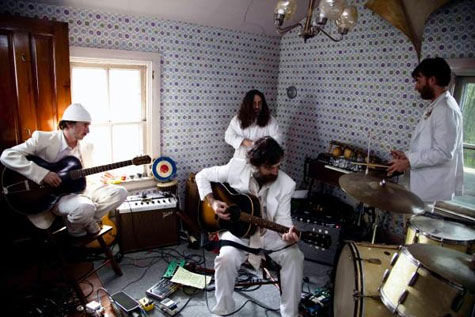 REINVENTING TRADITION Califone see the future. |
You can listen to 30 seconds of any Califone song and get a fair idea of what the band is all about. Formed in Chicago in 1998 by members of the cult Chicago blues/rock group Red Red Meat (also led by Tim Rutili), Califone have released six proper LPs of experimental roots music in which the band pare Americana down to its bare essentials — usually an acoustic guitar, Rutili’s ragged voice, and some vague impressionistic lyrics — and reconstruct it with a varying assortment of the following: dustings of ambient electronics and static; minimal, unorthodox percussion; found sounds; strings, piano, and/or horns; an amorphous undercurrent of electric guitar feedback.
Califone are unflashy, consistent, reliable, and a lot of other adjectives that predispose them to a career of stellar reviews and a modicum of media attention and commercial returns, despite impressive opening sets on tours with the likes of Modest Mouse and Iron & Wine. It’s a shame, because at their best — which is to say, at the heights they’ve operated from since 2003’s Quicksand/Cradlesnakes (Thrill Jockey) — Califone have blazed a trail squarely aimed toward the future of traditional American music.
The band’s current tour, which brings them to SPACE Gallery on October 21, will feature their new album, All My Friends Are Funeral Singers (Dead Oceans), presented as a live, interactive soundtrack to Tim Rutili’s directorial film debut, which shares a title with the album and stars Califone alongside the actress Angela Bettis. (Bettis plays a psychic trying to force out the ghosts haunting her home.) The screening/performance will be followed by an additional set by the band.
The album, another masterful, superficially satisfying roots effort and another theoretical art-rock field trip, snakes through humid wetlands, arid deserts, and encroaching technology. The seven-minute opener “Giving Away the Bride” does all of these at once, effectively summarizing the band’s advances on 2006’s Roots & Crowns (Thrill Jockey). It begins with a dry, crackled drum-machine beat and the muffled ticking of a clock, with layers of detail added by the measure: a bullfrog’s croak of distorted guitar; Rutili’s creepy, evocative lines like “wine-black teeth, talkin’ talkin’ talkin’” sung in a double-tracked rasp, one occasionally trailing or contradicting the other; xylophones clinking next to digital bleeps. Halfway in, two martial drumbeats (recorded to separate channels) and a piano usher in some unexpected gravitas, as Rutili’s repeating little more than “nah-nah-nah-nah, never alone.” What reads like an endless, disjointed Fiery Furnaces song positively breezes by, despite its elaborate trappings.
Other tracks are equally detailed under more concise, conventional circumstances. On “Polish Girls,” industrial sounds clatter and buzzsaw guitars whir through each bridge before they’re subsumed by a cinematic burst of mariachi-band flair. Rutili sings, “trees are growing from our grave/Roots are tangled in our bones,” always reasserting the juxtaposition of objects or feelings that shouldn’t fit together, until nature imposes that they do. His lyrics are, as ever, an effective commentary on Califone’s music, disparate but ceaselessly fluid and organic.
Perhaps in a nod to the All My Friends film, the galvanizing “Bunuel” imagines the surrealist director Luis Bunuel aging, chain-smoking, fiddling with guns, and dreaming of “stars in the tidepool/Dust in the daylight.” The hand-clapped, jug-band enthusiasm of “Ape-Like” is set on edge by a shivering organ. “Krill,” the best of a trio of lush ballads on the second half of the album, is a gorgeous vocal showcase for Rutili, who, like Jeff Tweedy, is just as affecting when somber and disembodied as he is reaching and charismatic.
So, yes, another formulaic Califone album is another highlight in a career full of them. But let’s not undervalue these feats. Califone have not only conceived of a novel way of updating roots music, they’ve managed to incorporate it with any manner of noise and experimentation without ever disrupting the simple beauty of its heritage. It’s a marvel that so few bands, outside of (prominently) Yankee Hotel Foxtrot-era Wilco, have attempted anything similar, but perhaps the reason is obvious: no one could advance this form as far, and with as many permutations, as Califone already have.